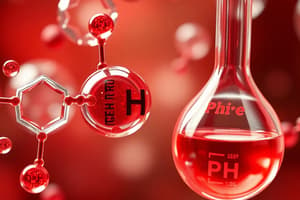Podcast
Questions and Answers
What is blood pH primarily responsible for regulating?
What is blood pH primarily responsible for regulating?
- Blood sugar levels
- Oxygen levels
- H+ and HCO3- ions (correct)
- Electrolyte balance
What ions does blood pH regulate?
What ions does blood pH regulate?
- H+ and Cl- ions
- Na+ and K+ ions
- Ca2+ and Mg2+ ions
- H+ and HCO3- ions (correct)
What is the primary function of the blood pH regulatory system?
What is the primary function of the blood pH regulatory system?
- Regulating body temperature
- Regulating blood sugar levels
- Maintaining acid-base balance (correct)
- Maintaining blood pressure
What is the result of blood pH imbalance?
What is the result of blood pH imbalance?
What ions are involved in the regulation of blood pH?
What ions are involved in the regulation of blood pH?
Flashcards are hidden until you start studying
Study Notes
Blood pH Regulation
- Blood pH is primarily responsible for regulating the concentration of hydrogen ions (H+) in the blood.
- The blood pH regulatory system regulates the balance of three important ions: hydrogen ions (H+), bicarbonate ions (HCO3-), and carbon dioxide (CO2).
- The primary function of the blood pH regulatory system is to maintain a narrow pH range of 7.35-7.45, which is crucial for proper cellular function.
- An imbalance of blood pH can lead to serious health consequences, including respiratory and metabolic acidosis or alkalosis.
- The ions involved in the regulation of blood pH are hydrogen ions (H+), bicarbonate ions (HCO3-), and carbon dioxide (CO2), which work together to maintain acid-base homeostasis.
Studying That Suits You
Use AI to generate personalized quizzes and flashcards to suit your learning preferences.




